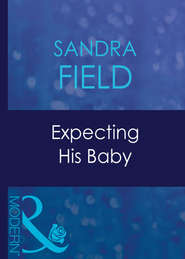По всем вопросам обращайтесь на: info@litportal.ru
(©) 2003-2025.
✖
Pregnancy Of Convenience
Автор
Год написания книги
2018
Настройки чтения
Размер шрифта
Высота строк
Поля
“I can’t stay here any longer.”
She’d spoken in such a low voice he had to strain to hear her. She looked at the end of her tether, as though at the slightest provocation she would start to weep and be unable to stop. “I want to leave here, too,” Cal said dryly. “But unfortunately neither one of us can influence the weather.”
“To be here,” she faltered, “don’t you see, it brings it all back, all those terrible, wasted years. And the baby…I can’t bear to think about the baby.”
The fire had died down; he and Joanna were isolated in the small circle of his flashlight, darkness and the cry of the wind pressing in on all sides. Cal had never seen such desolation on a woman’s face; it cut him to the heart. Clumsily he sat down on the bed and put his arms around her.
For a few seconds she yielded, her forehead burrowed in his shoulder, her spine a long curve of surrender. Through the thin cotton of his shirt, he felt tears dampen his skin, and realized she was weeping without a sound. “Did you really abort the baby?” he asked with sudden urgency.
“I didn’t! I swear I didn’t. It didn’t matter that I no longer loved Gustave, I’d have loved the baby…I already did love it.”
He wanted to believe her—God, how he wanted to! So what was holding him back?
Her hair smelled enticingly of hyacinths, and the soft weight of her breasts against his chest—bare where his shirt was open—filled Cal with a fierce surge of desire. He fought to subdue it. Was he about to take Gustave’s widow to bed in Gustave’s house? What kind of a man would that make him? In a harsh voice he scarcely recognized as his own, he said, “I don’t know who the hell to believe—you or your dead husband’s parents.”
She flinched as though he’d physically struck her. Then she pulled free of him, swiping at the tears on her cheeks with the back of one hand. “You can keep your sympathy,” she said stonily, “I as good as killed Gustave and I certainly killed the baby. Oh, and I was promiscuous, let’s not forget that.”
“I’m not sure sympathy’s what this is about,” said Cal, and kissed her hard on the mouth.
It was as though the flames suddenly rekindled in the hearth, lapping him in their fiery dance. He’d never felt such raw, basic hunger in his life. His arm tightened around her waist. Her ribs were a taut curve, her hair tumbling over the hand that was pressed to her back. Then her lips, warm and soft, yielded so suddenly and so ardently to his kiss that he’d have sworn she was enveloped in the same fire. He thrust with his tongue and fumbled for the buttons on her pajamas.
She struck him hard on his bare shoulder with her bunched fist and yanked her head free. “Don’t!”
His arms aching with emptiness, Cal snarled with no subtlety whatsoever, “You kissed me back.”
“All right, so I did. So what?”
“You’ve been widowed three months and you kissed me as though it’s been three years.”
“For the space of five seconds, I kissed you.”
“Franz said you were promiscuous.”
“Franz? I’d hardly call him a reliable witness.”
She had a point, Cal thought reluctantly. He knew nothing about Franz. Had never met him before that day on Mont Blanc.
“Anyway,” Joanna went on, “what about you? Why would you want to kiss me? You’ve made it all too clear you don’t believe a word I’ve said. Which means you think I’m responsible for Gustave’s death, and—” momentarily she faltered “—the loss of the baby, as well.”
Cal had no answer for her. When he was blinded by lust, how could he possibly discern the truth? But if he really did disbelieve her, he was kissing a woman he should despise.
He’d loved Suzanne when he married her, he’d never been unfaithful to her, and anyone he’d taken to his bed since her death he’d at least liked. He pushed himself up from the bed, noticing with one small part of his brain that Joanna’s cheeks were still streaked with tears and that the bruise on her forehead was now a lurid mix of purple and yellow. “Let’s just call it temporary insanity,” he said tersely. “On both our parts.”
“It’s not going to happen again!”
He could see the hard jut of her nipples beneath her jacket. “You don’t have a worry in the world,” he grated. “I’m going back to sleep. Alone. And we’d better hope the weather improves.”
“It’s got to,” she said with an edge of real desperation.
He felt exactly the same way. Although he was damned if he was going to tell her that. He’d already made enough of a fool of himself, no point in adding to it. “Are you warm enough?” he asked curtly.
“Yes. Thank you.”
He flicked off the flashlight and lowered his body onto a couch that was at least eight inches too short for him. He didn’t care what the weather was doing, he was out of here once it was daylight. And he wasn’t taking Joanna Strassen with him.
Daylight was chinking through the dark brown curtains when Joanna woke up. She lay still for a moment, totally disoriented, wondering why her head hurt and why the wind was howling so ferociously that the house creaked under its onslaught. Then it all came flooding back. Her disastrous and ill-thought-out attempt at reconciliation with Dieter and Maria. Her precipitate departure yesterday afternoon and the way the car had slid so gracefully and inevitably into the telephone pole. Her return to consciousness in this room, the waves of dizziness and pain, the gradual realization that she was back in the one place in the world she’d hoped never to see again.
And then there was her rescuer.
It wasn’t chance that she’d left him to the last. Had she ever laid eyes on a man so magnetic, so masculine, so self-assured? So guarded, so reluctant to trust her? Why couldn’t she have been rescued by a country farmer in a three-ton truck, with a plump, friendly wife and a kitchen smelling of borscht and freshly baked bread?
Cal was his name. And that was all she knew about him.
Except for the inescapable fact that his two brief kisses had melted the very bones of her body.
She had to get out of here. Soon. Sooner. Soonest.
Cautiously Joanna sat up. In the dim light, she could see Cal stretched out on the couch, his feet dangling over the edge, his neck stuck at an awkward angle. A blanket half covered his long body. He was still sound asleep.
He’d saved her life. If he hadn’t come along, she’d have frozen to death.
She shivered, knowing that in spite of all the unhappiness of her marriage, and the acute pain of the last few months, she was deeply glad to be alive. So she had much to thank him for, this dark-haired stranger with eyes as gray and depthless as a winter sea.
If only he didn’t share Dieter and Maria’s opinion of her character. Which was, to put it mildly, rock-bottom. Why that should hurt her so badly, she didn’t understand. He was a stranger, chance-met and soon to be forgotten. So why should it matter what he thought of her?
Not liking her own thoughts, Joanna got up as quietly as she could, parted the curtains and peered outside. Her heart sank. All she could see was the driven whiteness of snow; all she could hear was the howl of the wind. It was worse than yesterday, she thought numbly. But she had to leave. She had to.
From behind her Cal said with a lack of emotion that infuriated her, “Looks like we’ll be stuck here today, too.”
She whirled, frightened that she hadn’t heard him get up, let alone cross the room. He was standing altogether too close, his crumpled shirt unbuttoned from throat to navel, his cords creased from sleeping in them. The sheen on his tousled hair reminded her of mahogany; her mother had left her a beautiful little mahogany end table. Then he yawned, and the corded muscles of his belly tightened; all his muscles were truly impressive, she thought wildly.
“I’m leaving here this morning,” she spat. “You can do what you like.”
“And how are you going to leave?” he said mockingly. “Your car’s wedged to a telephone pole three miles down the road, and I’m not driving you anywhere, not in this.” He lifted one brow. “Unless you think Dieter will lend you his car?”
So angry she could barely talk, she seethed, “I will not stay one more hour in a house where everyone—including you—thinks I’m a cold-blooded, immoral bitch!”
“I’m not—”
As if he hadn’t spoken, she swept on, “I made the biggest mistake in my life—apart from marrying Gustave, that is—to fly out here with belongings of his I thought his parents should have. To believe that now he was dead, maybe we could somehow make peace. I sure go to the top of the class for naiveté.”
“Naive isn’t exactly the word I’d use for you.”
“But you know nothing about me, Mr. Cal whatever-your-name-is. Only what you’ve been told. You’re the one who’s naive. You believe Dieter and Maria, who thought the universe revolved around Gustave. And you believe Franz, who hero-worshiped him and made one heck of a lot of money out of him into the bargain. Three cheers for you.”
She was being very childish, she thought in a sudden wave of exhilaration. And it felt extremely good. She added peevishly, “What is your last name? And what are you doing here? You don’t look the type to be a friend of the Strassens.”
“Cal Freeman,” Cal said, and watched her closely.











